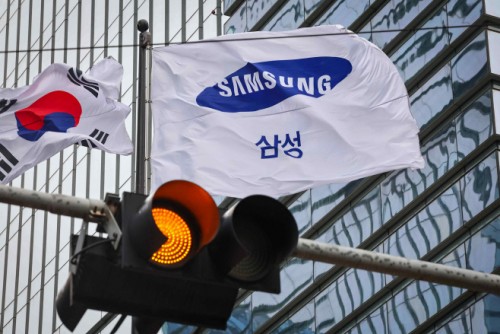 |
| Samsung Electronics headquarters in Seoul./ Source: Yonhap News |
AsiaToday reporter Jeong Moon-kyung
Samsung Electronics announced that it will start mass production of 12-layered HBM3E chips, a high-bandwidth DRAM optimized for the generative AI era, in the second quarter. Its move to mass production comes quickly after it announced back it February that it successfully developed the industry’s largest 12-layer DRAM. Since it has been less than a month since it started mass production of 8-layered chips, the industry observers believe that it has launched an offensive to lead the market in anticipation of explosive growth of HBM. Many believe that Samsung has implemented its “super-gap” strategy with HBM3E, which is called the 5th generation of HBM DRAM, in the current market dominated by SK Hynix with its 4th generation of HBM3.
On April 30, Samsung Electronics announced the schedule for mass production of its next HBM through a conference call.
“We will start mass production of 8-layered HBM3E products starting April, which will generate sales starting the end of the second quarter,” the tech giant said. “We will also start production of 12-layered products in the 2Q, and the production of HBM3E will account for more than two thirds.” The company said this year’s HBM supply is expected to more than triple compared to the previous year and more than double next year compared to this year.
The active interest of Nvidia, a big player in AI chips, also fueled Samsung’s aggressive offensive. Nvidia is expected to receive Samsung’s HBM3E chips from the beginning of the second half of the year, which is earlier than originally expected. Considering that SK Hynix had exclusively supplied the 4th generation of HBM3 to Nvidia, industry analysts say that it deserves to be Samsung’s counterattack.
Meanwhile, Samsung Electronics announced that it has successfully turned its chip business into a surplus for the first time in five quarters. The device solution (DS) division, which operates the chip business, posted KRW 23.14 trillion won in consolidated revenue and KRW 1.91 trillion in operating profit for the first quarter. “The supply and demand of the memory chip market will become tighter this year as supply cannot keep up with demand,” Samsung Electronics said. “The profitability of DDR5 will also improve,” the company added.
#Samsung #HBM3E
Copyright by Asiatoday
Most Read
-
1
-
2
-
3
-
4
-
5
-
6
-
7





















